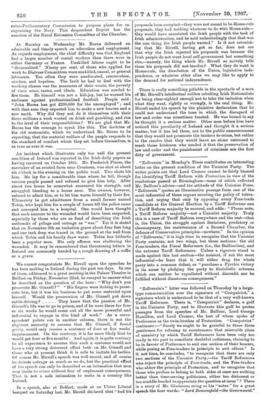We cannot congratulate Mr. Birrell upon the speeches he has
been making in Ireland during the past ten days. In one of them, addressed to a great meeting in the Palace Theatre in Belfast on Friday, November 22nd, he essayed to answer what he described as the question of the hour: " Why don't you prosecute Mr. Ginnell ? " "His fingers were itching to prose- cute him, but it was his business to put some restraint upon himself. Would the prosecution of Mr. Ginnell put down cattle-driving P They knew that the passion of Mr. Ginnell's life was to go to prison, and if he were there for four or six weeks he would come out all the more powerful and influential to engage in this kind of work." As a corre- spondent points out in another column, there is not the slightest necessity to assume that Mr. Ginnell, if found guilty, would only receive a sentence of four or five weeks' imprisonment. On the contrary, it is far more likely that he would get four or five months'. And again, it is quite contrary to all experience to assume that such a sentence would not have a very strong deterrent effect both on Mr. Ginnell and those who at present think it is safe to imitate his tactics. Of course Mr. Birrell's speech was well meant, and of course be detests outrage as much as we do, but the practical effect of his speech can only be described as an intimation that men may incite to crime without fear of unpleasant consequences. That is not a safe intimation to make in a country like Ireland.


















































 Previous page
Previous page